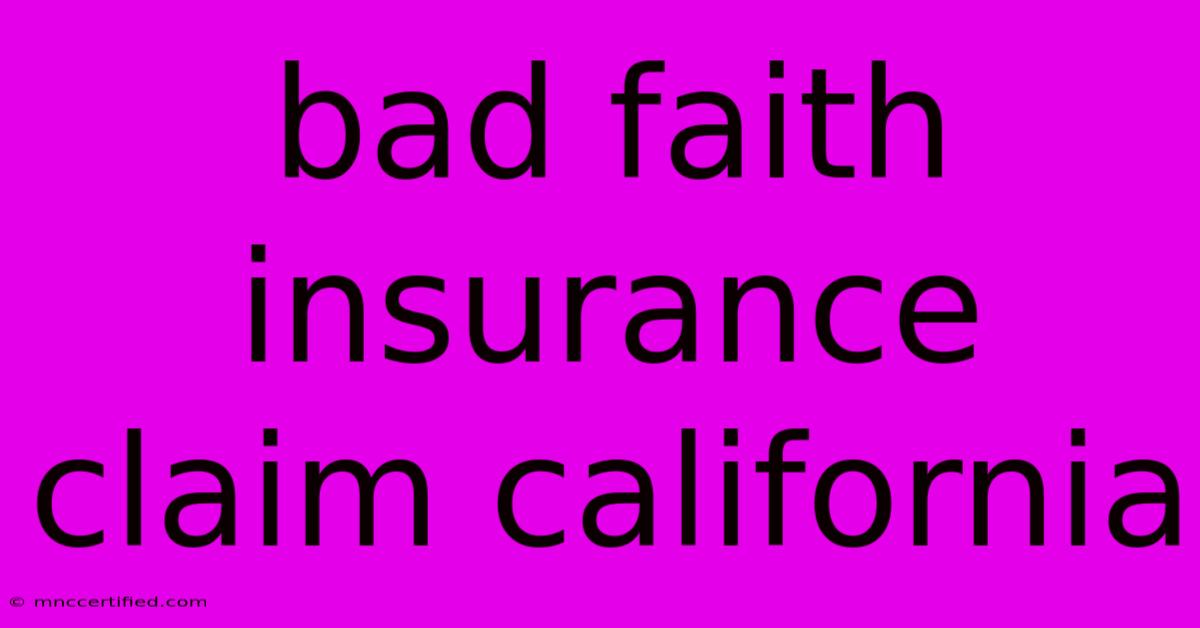Bad Faith Insurance Claim California

Table of Contents
Navigating the Maze: Understanding Bad Faith Insurance Claims in California
In California, insurance companies are legally obligated to act in good faith when handling claims. However, sometimes, insurers engage in practices that unfairly deny or delay rightful compensation, leaving policyholders in a precarious position. This is known as bad faith insurance and can have significant consequences for the insured.
What is Bad Faith Insurance in California?
Bad faith insurance refers to an insurer's failure to act in good faith and with fair dealing when handling a claim. This can involve:
- Unreasonable denial of a claim: Denying a claim without proper investigation or justification.
- Delaying the claims process: Intentionally prolonging the settlement process to discourage the insured from pursuing their claim.
- Failing to properly investigate a claim: Not thoroughly investigating the validity of a claim, leading to wrongful denials.
- Misrepresenting policy coverage: Misleading the insured about the extent of their coverage or the terms of their policy.
- Unfair settlement offers: Offering a settlement amount that is significantly lower than the actual value of the claim.
How to Identify a Bad Faith Insurance Claim
Identifying bad faith insurance practices can be challenging, but here are some red flags to watch out for:
- Unjustified denials: The insurer provides no valid reason for denying the claim.
- Lack of communication: The insurer is unresponsive or provides vague or conflicting information about the claim.
- Delay tactics: The insurer stalls on investigating the claim or responding to requests for information.
- Unreasonable demands: The insurer requests unnecessary documentation or imposes unrealistic requirements.
- Lowball settlement offers: The insurer offers a settlement amount that is significantly less than the actual value of the claim.
Consequences of Bad Faith Insurance Practices
If an insurance company engages in bad faith practices, the insured can take legal action to seek compensation for damages. These damages can include:
- Economic losses: Lost wages, medical expenses, property damage, and other financial losses.
- Emotional distress: Mental anguish, pain and suffering, and emotional trauma resulting from the insurer's actions.
- Punitive damages: Financial penalties imposed on the insurer to punish them for their wrongdoing.
How to Protect Yourself from Bad Faith Insurance Practices
- Read your policy carefully: Understand the scope of your coverage and the terms of your policy.
- Keep detailed records: Document all communication with your insurer, including claim details, dates, and responses.
- Consult with a legal professional: A lawyer specializing in insurance bad faith can help you understand your rights and guide you through the claims process.
- File a complaint: If you suspect bad faith practices, file a complaint with the California Department of Insurance.
Conclusion
Navigating insurance claims can be a stressful and confusing process. Being aware of bad faith insurance practices and knowing your rights can help you protect yourself from exploitation. If you believe you are a victim of bad faith insurance, seek legal advice and explore available options for seeking justice and compensation. Remember, you deserve fair and honest treatment from your insurance company.

Thank you for visiting our website wich cover about Bad Faith Insurance Claim California. We hope the information provided has been useful to you. Feel free to contact us if you have any questions or need further assistance. See you next time and dont miss to bookmark.
Featured Posts
-
Bitcoin Breaks 81 000 Trump Election Impact
Nov 11, 2024
-
Leicester 0 3 Man Utd Comfortable Victory
Nov 11, 2024
-
Yellowstone Season 5 Part 2 What To Expect
Nov 11, 2024
-
Ethos Life Insurance No Medical Exam
Nov 11, 2024
-
Broncos Field Goal Blocked Chiefs Win On Walk Off
Nov 11, 2024